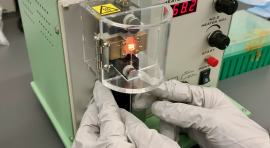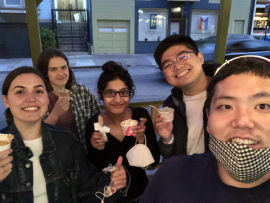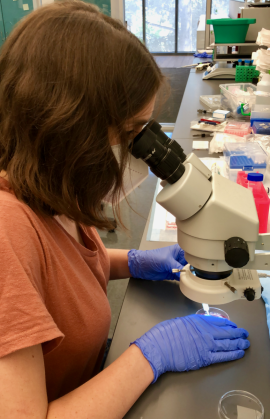Palo Alto, CA — The original plan was to take only one undergraduate intern for the summer of 2021, but five great candidates applied. With his own students’ and children’s COVID cancellations and disappointments in the back of his mind, Vinit Mahajan M.D., Ph.D, vice chair for research and director of the Molecular Surgery Program in Stanford’s ophthalmology department, decided to take them all.

“I was concerned that we might not have the staff to teach and train so many students,” Mahajan said. “My senior research team really stepped up. We asked ourselves, “How can we create the best possible undergrad summer internship?”
Having taught surgery to ophthalmology residents and vitreoretinal fellows for over a decade, Mahajan felt it was important to incorporate highly structured teaching methods used in his operating room.
“The typical training approach is to just throw someone into a lab and wish them well. But if you want to move someone quickly up the learning curve to become super productive, you have to take a very thoughtful approach,” Mahajan said.
Postdoctoral fellow Young Joo Sun Ph.D. and lab group leader Soo Hyeon Lee Ph.D. developed a teaching program that introduced the interns to on-going projects and guided them to conduct meaningful research. This guidance included a broad spectrum of research assessments including problem recognition, reference investigation, experimental design, training of bench skills, rational troubleshooting, data translation, and scientific writing.

Training for undergrads Caitlin Kunchur, Elena Mujica, Richard Phan, Claudia Phillips, and Shriya Reddy began during their spring semester. They attended a weekly zoom seminar prior to in-person research so they could become contributing members of the lab once they met on site as a team. During the zoom seminars, Young Joo presented Dr. Mahajan’s vision research mission and introduced projects and fundamental, underlying scientific concepts. Graduate student Gabe Velez taught bioinformatics. Lab scientist Jing Yang taught animal surgery. Other lab members reviewed manuscripts and research methods with the students.
“We listened to the interests and goals of each student,” Mahajan said. “I wanted their project and experience to have personal meaning for each of them.”
Project opportunities included ocular drug development, retinal protein structure determination, and bioinformatic analysis on genetic ocular diseases and their pathogenic variants. Students also worked in small teams and learned scientific manuscript writing.
Young Joo said, “Even though the interns were not familiar with the project topics and tasks at the beginning, they proactively engaged with the material, studied, and conducted experiments. They were not only good at following instructions and absorbing information, but they were also very creative when troubleshooting problems and identifying alternative solutions.”
Over the summer, the interns organized a bioinformatics database and automated a datamining procedure with very minimum guidance, and they delivered their bioinformatic findings with insightful, powerful, artistic displays.
Soo Hyeon said, “Our summer interns were very talented and motivated, and it was a pleasure to work with them. I appreciated their enthusiasm for research. They were not only technically supporting lab experiments but also making significant progress in multiple projects. I hope to meet them again as research collaborators.”
Young Joo added, “I was impressed and happy to see them growing as junior scientists and key contributors in our research community. They fast-forwarded multiple manuscripts, which are currently in press, submitted, or in preparation. Without their contributions, I would not be as productive as I am right now, and I was very glad to make them coauthors.”
Mahajan said, “The combination of great mentors and bright students is magical! Soo Hyeon and Young Joo were natural leaders who incorporated the interns into lab seamlessly, made them feel valued so that they asked questions and took risks, and trusted them with a level of independence that led to great productivity.”

Caitlin Kunchur had the opportunity to formulate intravitreal drug delivery devices using liposomes and polymer implants. By designing different formulations, she improved her ability to experimentally validate a method for in vitro drug release testing. In addition to the general wet lab skills she acquired, she also gained experience in bioinformatics and developed scientific presentation and writing skills.
Caitlin said, “My mentor, Dr. Lee, was a wonderful teacher throughout the entire experience. She was very encouraging in the lab, especially when one of our trials was unsuccessful, and she was always open to explaining unfamiliar concepts to me. As a member of the Mahajan lab, I gained a valuable community of fellow researchers who are incredibly inspiring and passionate about finding cures for eye disease."
“The skills the interns gained this summer can be transferred successfully to a variety of scientific research settings,” Mahajan said.
Elena, an undergraduate from U.C. Berkeley, worked on several projects over the summer, which allowed her to experience the breadth of research that can be done in translational medicine. She assayed proteomics-derived compounds for their inhibition of the retinal disease proteases, performed western blots to determine the autoproteolytic activity of calpain-5 mutants, analyzed the computer-modelled structure of a retinal protein to distinguish disease-causing mutations, and worked with her co-interns to bridge the information gap between protein structure and genetic retinal disease-related databases.
Elena said, “I was very lucky to work on several active manuscripts, which taught me a lot about how to communicate scientific findings clearly and concisely. Young Joo and Soo Hyeon were both excellent mentors who always encouraged me to pursue the work I was interested in - they kept me busy!”
Richard Phan won a summer Bio-X research award. He had the opportunity to investigate a transcription factor involved in retinal inflammation and helped uncover new therapeutic targets. To do so, he learned transgenic mouse handling, phenotype characterization, and mammalian cell culture techniques. He plans to apply the lab skills that he learned, but more importantly he wants to contribute to a lab environment that is as encouraging and cooperative as the Mahajan Lab.
Richard said, “My experience with Dr. Mahajan, and mentors, Young Joo, Soo Hyeon, and Jing, was absolutely incredible; the atmosphere in the lab was so supportive, comforting, and uplifting. As a first-generation, low-income (FLI) student, this summer lab experience was my first real exposure to research, and it made me consider delving into clinical research in the future alongside my aspirations to become a physician.”

Claudia Phillips studied the structures of three retinal disease proteins using protein crystallography and computer simulations. She also wrote code to parse gene variants from an online database for a large-scale data project. She was mentored by Young Joo Sun who encouraged her at every stage of the research process and had confidence in her capabilities, even when she was unsure of herself.
Claudia said, “Young Joo helped me to feel at home in the lab, even while constantly challenging me to work hard and grow. I think the most valuable lesson I took from my research last summer was that incredible work is possible when you and the people around you are committed and enthusiastic about the work being done.”
She added, “I learned a lot about designing, expressing, and purifying protein constructs for X-ray crystallography, and I had the opportunity to engage with cutting-edge protein crystallography equipment and techniques. As an aspiring structural biologist, it was truly a dream come true.”
Shriya Reddy, incoming Stanford freshman, learned about the lab from Claudia. Shriya worked remotely analyzing complex proteomics datasets with Soo Hyeon. She joined lab meetings via zoom and will be off to a strong start when she starts at Stanford in the fall.
Dr. Mahajan said, “I am really proud of the program Young Joo, Soo Hyeon, and I orchestrated for our interns, but I am even prouder of how hard the interns worked to take advantage of every opportunity we gave them. I am confident these students will have amazing, impactful careers. It is a privilege to have mentored them along the way.”

